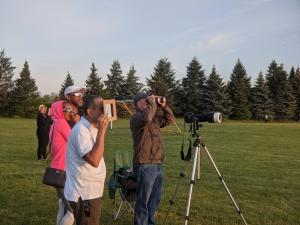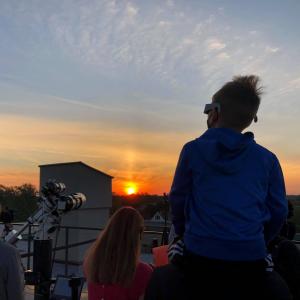
Solar eclipse as seen from Rochester
taken by Mike Wash TAG Volunteer at RMSC
An annular eclipse commonly referred to as a "ring of fire," occurred on June 10th and was visible at sunrise from parts of Northeastern US, Canada, Greenland, the Arctic, and Russia. Learn more about more upcoming solar eclipses: https://www.nisenet.org/solareclipse
Earlier this month, community members, science enthusiasts, astronomy lovers, and stargazers gathered in parks and on rooftops, virtually and in- person to look to the skies and celebrate the annular solar eclipse, also called the "ring of fire".

Rochester Museum
and Science Center
Rochester Museum and Science Center,
Rochester, NY
Over in Rochester, NY at the Rochester Museum and Science Center, museum staff and guests started their morning off with a sunrise eclipse at the Hamlin Beach and Martin Road Park.
More info about the event can be found here on Facebook
And you can see great photos from the event here on Facebook

Buffalo Museum of Science
Buffalo Museum of Science,
Buffalo, NY
In Buffalo NY, at the Buffalo Museum of Science, participants looked up to witness a rare astronomical event. The Earth, sun, and moon lined up for a partial solar eclipse, which was already in progress when the sun rose at 5:36 a.m. Buffalo Museum of Science staff were joined by members of the Buffalo Astronomical Association and a small group of museum members to witness the eclipse from the museum's rooftop vantage point of the horizon through solar-viewing safety glasses.
Learn more about the event and see photos here on Facebook

American Museum of Natural History, NY, NY
And at the American Museum of Natural History in New York City, the museum used OpenSpace visualization software to blast off into space to investigate our Sun-Earth-Moon system and witness the shadow of the Moon as it traveled across the globe. This virtual celebration of the eclipse was hosted by staff astrophysicists with a special guest appearance by Neil deGrasse Tyson, astrophysicist and the Frederick P. Rose Director of the Hayden Planetarium. Learn more about the event here: https://www.amnh.org/calendar/solar-eclipse-2021
Learn more about Eclipses
The NISE Network has a collection or resources about upcoming eclipses along with educational materials and professional development resources. Learn more here: https://www.nisenet.org/solareclipse and https://www.nisenet.org/lunareclipses
